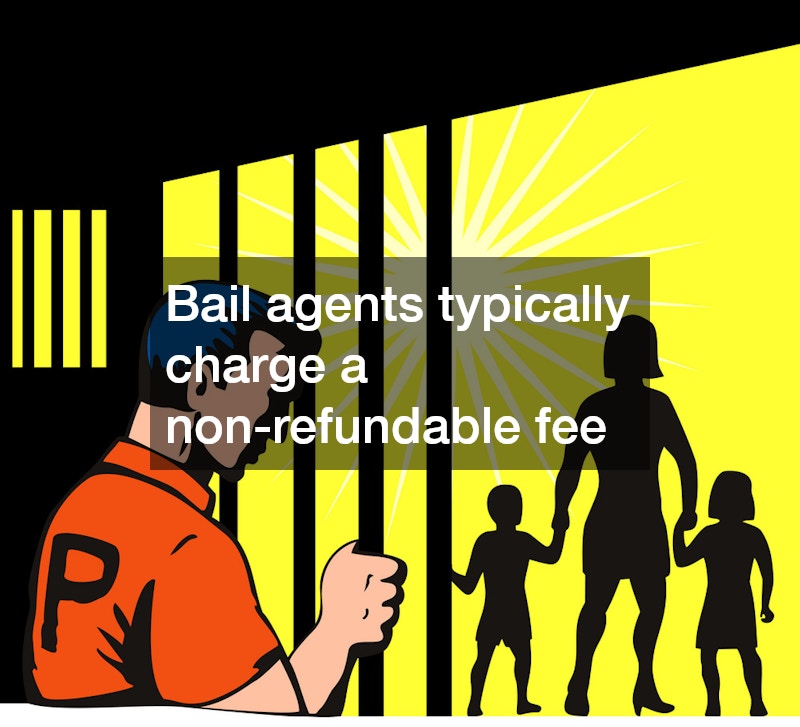Bail agents play a critical role in the criminal justice system by providing financial options for those unable to afford bail. Their primary function is to post bail on behalf of the accused, allowing for temporary release from custody. This service is essential, enabling individuals to continue their daily activities while awaiting court proceedings.
Understanding how bail agents operate is crucial for anyone who might need their services. Their knowledge can be the difference between remaining in custody and having the opportunity to prepare adequately for upcoming legal challenges.
Bail agents typically charge a non-refundable fee, often around 10% of the total bail amount. This fee compensates the bail bondsman for taking on the risk of the accused not appearing for their court date. Considering this fee is non-refundable, it’s vital for clients to be aware of all costs involved before proceeding. It’s common for clients to provide collateral besides the fee, which can include property, vehicles, or other valuable assets. With this understanding, clients are better prepared to negotiate terms and conditions when they engage with bail agents.
Bail agents often work around the clock, ready to assist clients at any time, understanding that arrests can occur unexpectedly. It is important for clients to choose a reliable and available bail agent to ensure swift assistance in emergencies. Limited access to these services could mean longer periods in custody and disruption to daily life. Knowing that an agent can act quickly provides peace of mind, ensuring that all necessary documentation and requirements can be fulfilled promptly. Engaging a trustworthy bail agent makes it easier to navigate the bail process efficiently.
Factors to Consider When Choosing a Bail Bond Agent
When selecting a bail agent, their licensing and credentials are of utmost importance. All professional bail agents are required to be licensed by the state, and working with a licensed agent ensures compliance with local laws and regulations. It’s advisable to verify their credentials and to inquire about their experience within the field. Clients should assess any past client reviews or testimonials to gauge the reputation and reliability of the bail agent. Doing thorough research on potential bail agents can prevent future disappointments and complications during the bail process.
The cost associated with hiring a bail agent can vary, so understanding their fee structure is crucial. Some agents might offer flexible payment plans, making services more accessible to those with financial restraints. It’s essential to discuss all potential costs upfront to avoid hidden charges. Clients should discuss options thoroughly to determine what best suits their financial situation, and some agents are willing to accommodate individual circumstances. Being transparent about one’s financial limitations from the start can foster a more straightforward transaction.
Communication and availability are key factors in selecting a suitable bail agent. A good agent should maintain clear communication, providing regular updates and answering any questions the client may have. They should be available whenever needed, especially since situations can evolve rapidly. Ensuring the bail agent understands clients’ needs can build confidence in the services provided. Clients should never feel in the dark and should expect support and guidance throughout the bail process.
The Process of Securing a Bail Bond
To initiate the bail bond process, clients must first contact a bail agent, who will assess the situation and explain the steps involved. The agent will require basic details regarding the defendant and the circumstances of the arrest. This information helps the bail agent evaluate the risk and calculate the appropriate bail amount. Understanding this initial paperwork ensures that there are no delays in securing the bond. By collaborating with an experienced agent, clients can streamline the process, securing their loved one’s release more efficiently.
Once the necessary information is communicated, the baile’s terms and fees are discussed. If clients agree to proceed, the bail agent will post bail on behalf of the defendant. It is essential to ensure that both parties agree upon the terms and that they are comfortable proceeding. Once the bail is posted, the defendant is released from custody under the condition they will attend all subsequent court dates. Compliance with these conditions typically avoids further legal complications, and maintaining a cooperative relationship with the bail agent is advised.
After the defendant’s release, the bail agent remains a key resource for navigating the legal process. They may offer advice and reminders about upcoming court dates, ensuring that the defendant complies fully with legal obligations. Should any issues arise, the agent can assist in resolving them quickly. Their role doesn’t end with posting bail; they aim to support their clients throughout the entirety of their legal journey. Building a rapport with a reliable bail agent can provide valuable support and confidence throughout the legal proceedings.

